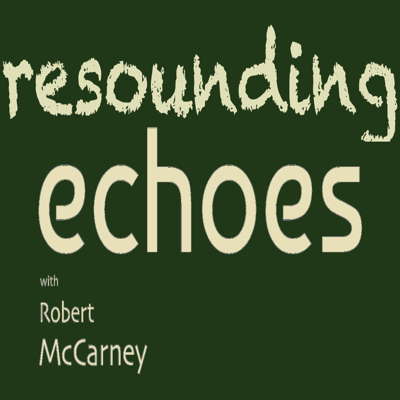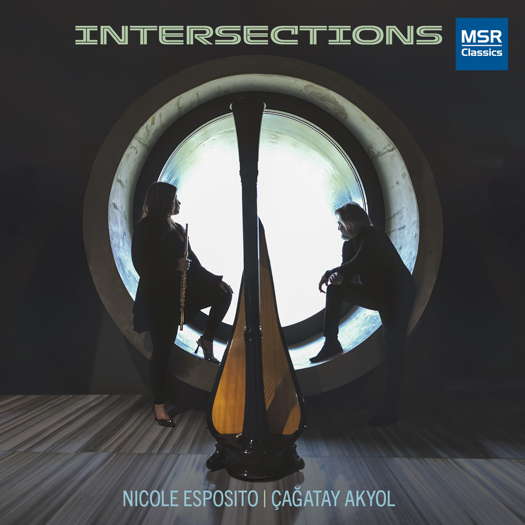 RESOUNDING ECHOES: From 2022 until 2024, Robert McCarney's regular series featured little-known twentieth century classical composers.
RESOUNDING ECHOES: From 2022 until 2024, Robert McCarney's regular series featured little-known twentieth century classical composers.
- Franz Dimmler
- Opera Barga
- Thomas Gould
- Jill Bowen Gardner
- Pavel Egorov
- Menotti: The Telephone
- Amanda Majeski
- Humperdinck: Hansel and Gretel
ARTICLES BEING VIEWED NOW:
- January 2022 Obituaries - Our summary of those the classical music world lost this month
- Igor Stravinsky
- Delphian Records Ltd
- Fryderyck Chopin
- Cedille Records

Intersections
MS1843 (MSR Classics, CD)
DDD
FIRST RELEASE (7 September 2023)
Playing time: 70'43"
Tracks: 27
Booklet pages: 12
℗ 2023 Nicole Esposito
© 2023 Nicole Esposito
Main country of recording: United States of America
Country of manufacture: United States of America
Reviewer: Geoff Pearce
Review of Intersections published on 13 October 2023
Nicole Esposito, flute
Çağatay Akyol, harp
Adrian Shaposhnikov (1888-1967):
Sonata for Flute and Harp
1 Andante con moto
2 Allegretto
3 Allegro molto
Kemal Günüç (born 1961):
Anatolian Colors – Four Small Pieces for Flute and Harp - first recording - written for Nicole Esposito and Çağatay Akyol
4 5/8
5 7/8
6 8/8
7 9/8
Fikret Amirov (1922-1984), transcribed for flute and harp by Nicole Esposito and Çağatay Akyol:
Sechs Stücke für Flöte und Klavier (1978)
8 Bardenweise (Song of the Ashug)
9 Wiegenlied (Lullaby)
10 Tanz (Dance)
11 In den Bergen Aserbaidschans (In the Mountains of Azerbaijan)
12 An der Quelle (At the Spring)
13 Nocturne (Nocturne)
Arno Babadjanian (1921-1983), transcribed for flute and harp by Nicole Esposito and Çağatay Akyol:
14 Melody
Assen Karastoyanov (1893-1976), transcribed for flute and harp by Nicole Esposito and Çağatay Akyol:
Ten Pieces for Flute and Piano
15 Prelude
16 Haiduchka
17 Echo
18 Spinstress
19 Harvest
20 Ratchenitza
21 Shepherds
22 Interwoven Threads
23 Lullaby
24 Daytchka
Three Old Istanbul Songs, arranged by Yusaf Yalçin and transcribed by Çağatay Akyol
Santuri Etham Bey (1855-1926):
25 Şehnaz Longa
Anonymous:
26 Katibim
Kevser Hanim (1880-1950):
27 Nihavent Longa
Music composed and transcribed for flute and harp.
At the meeting point of Asia and Europe, the confluence of East and West, lies the country of Turkey, now known as the Republic of Türkiye. At various times part of the Greek, Roman, Byzantine, and Ottoman Empires, Türkiye has a storied and tumultuous history, with deep roots and a strong sense of culture and tradition. Although parts of this tradition may seem to be obscured by shifting boundaries and continual interactions with other cultures, these intersections are in fact what makes the region distinct. Resting mostly on the Anatolian Peninsula, but also stretching into the Balkan Peninsula, musical influences on the region have been and remain diverse, ranging from historic Arabic and Persian interactions to more recent exchanges such as with neighboring Bulgaria and the Near East, including the former Soviet Republics of Armenia, Azerbaijan and Turkmen. Turkish composers turned to folk music as an inspiration for national art music and one commonality in the region is the resulting hybridization. The pieces on this album capture the convergence of these traditions and the unique interpretations of these elements by native composers.
Recorded in January 2023 in the Voxman Concert Hall, University of Iowa School of Music, Iowa City, Iowa, USA.

